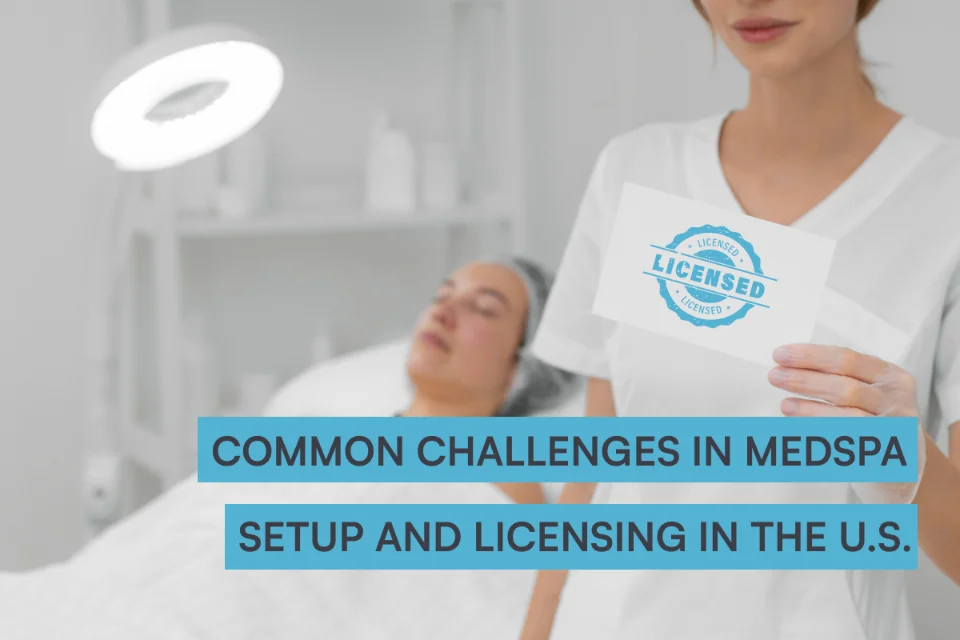Dreaming about being a medspa owner someday💆♀️
Turning that dream into a reality probably involves a few big unknowns: finding the right equipment, estimating costs and revenue, deciding on what treatments to offer, marketing, and – the big one – obtaining the right licenses.
We’re not going to sugarcoat the latter – medspa licensing isn’t easy. But good things are worth chasing, so we’re here to help you overcome those challenges in opening a med spa and getting the right paperwork in place.
Buckle up and keep reading to learn about common challenges medical spas face and the licensing required to stay compliant. Let’s roll!
Who can open a medspa business?
In most US states, only licensed physicians are eligible to open a medical spa. This is because the treatments medspas provide are mostly medical in nature and must be administered by licensed healthcare professionals, such as:
- MDs (Doctors of Medicine) and DOs (Doctors of Osteopathic Medicine): Although they’re licensed physicians, some states require additional certifications or qualifications such as board certification in dermatology or aesthetics, specialized training in injectables (Botox, dermal fillers), or laser treatments to open a med spa.
- NPs (Nurse Practitioners), PAs (Physician Assistants), and RNs (Registered Nurses): In most states, NPs and PAs must partner with a licensed physician who will be placed as a Medical Director of a medspa to own it and ensure compliance with state regulations.
This is the norm, as only 27 states allow nurse practitioners to open med spas.
General and medical licensing requirements for medspas in the U.S
Medspa licenses were created to ensure that those businesses are legal and provide safe services performed by qualified professionals. These are the key requirements medspas must meet to follow local, state, and federal regulations.
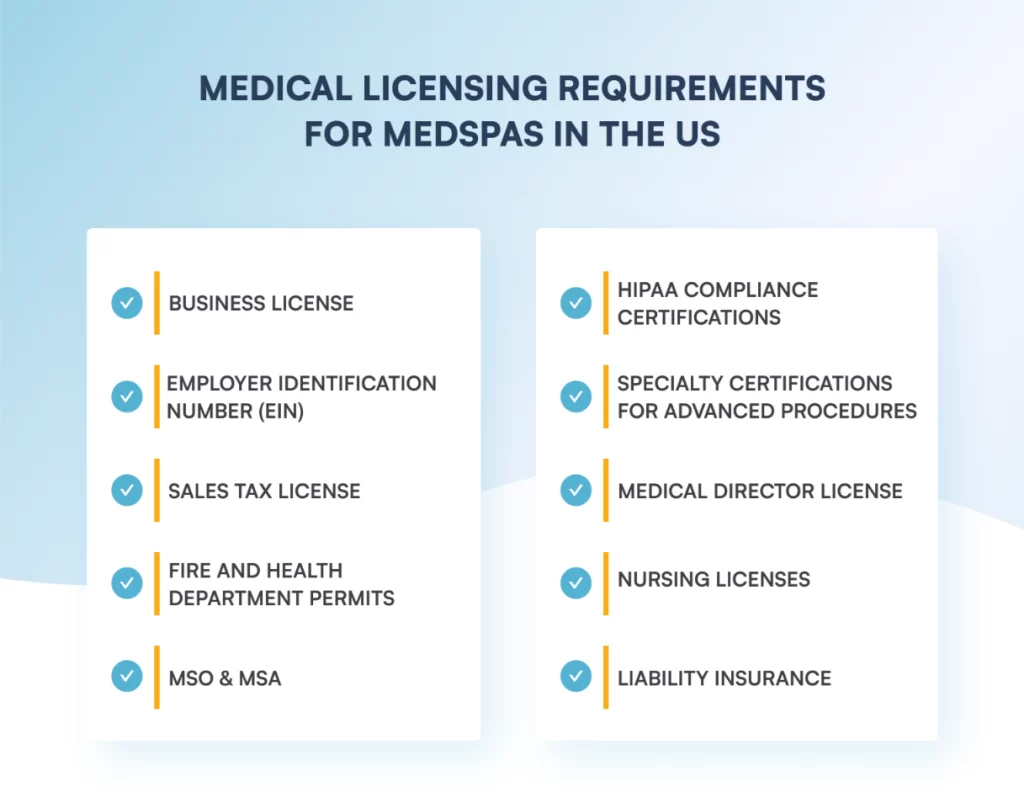
Business license ✔
A business license is the number-one requirement to ensure med spas adhere to the local regulations in the state where they will operate. A license covers aspects such as tax and zoning regulations.
Employer identification number (EIN) ✔
An employer identification number (EIN) is a nine-digit number given to businesses when they register as legitimate businesses.
As a business owner, you’ll need an EIN to open a business bank account, apply for business licenses and file your tax returns.
Sales tax license ✔
If your med spa sells products such as skincare products in addition to providing other services, you must obtain a sales tax permit to collect sales tax from your customers.
45 states in the US collect state-level state tax, and they differ by state.
Fire and health department permits ✔
Health and safety is paramount in any kind of public-facing space.
That’s why you’ll need to obtain other permits and licenses, like the Fire and Health Department permits. These vary from state to state, but you must obtain them to ensure you comply with that state’s fire safety and health regulations.
MSO and MSA ✔
An MSO effectively splits a med spa into two areas of responsibility, medical and non-medical. An MSO structure handles non-medical tasks – as in, the business side of the med spa – while helping you comply with state regulations, such as HIPAA, OSHA, FMLA, CLIE, and other state-specific laws.
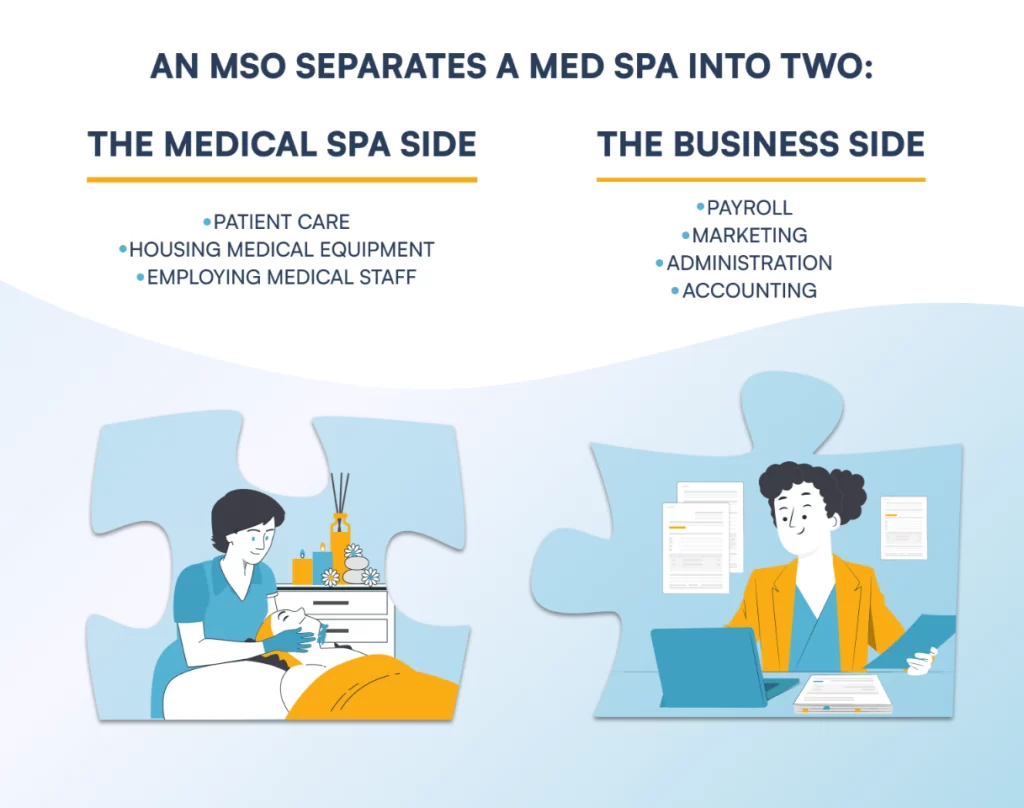
HIPAA compliance certifications ✔
Another big licensing acronym for your medspa is HIPAA, which stands for Health Insurance Portability and Accountability Act.
Med spas must follow HIPAA regulations because, like all healthcare practices, they handle sensitive patient information, known as PHI.
Any disclosure of that data without the patient’s explicit consent or knowledge can result in fines from $100 to $50,000, depending on the severity of the breach.
Medical director license ✔
Typically, medspas need to have a designated Medical Director to oversee the medical procedures that are performed each day.
You can assign this role to one of your physicians, but they must obtain a license in the state where that med spa would operate.
Typically, it’s the state’s medical board that issues these licenses.
Specialty certifications for advanced procedures ✔
Physicians, NPs, physician assistants, estheticians, or aestheticians who want to specialize in specific advanced medical treatments must obtain specialty certifications. Examples of this would be certifications for administering Kybella for fat reduction or CoolSculpting treatments.
These certificates are important to evidence that the professionals you’ve hired are qualified in what they’re administering and can do so safely.
Nursing licenses ✔
Besides licensed practitioners, nursing is a common route to working in a med spa (or even owning a med spa in the states where this is legal).
Having a nursing license shows that you have the medical knowledge necessary to practice safely.
Licensed nurses are those who have
✅ Graduated from an accredited nursing school: CCNE & ACEN are the primary accreditation bodies for this
✅ Passed the NCLEX-RN exam: It determines a nurse’s skills and knowledge for entry-level nursing
✅ APRN license: It is a nursing license that allows registered nurses to perform more advanced procedures like administering injections
Liability insurance ✔
Life without liability insurance is like opening the doors of your medspa without any kind of safety net.
Imagine having no liability insurance and a patient who files a lawsuit against you for negligence, errors, or omissions. It’s really not a risk worth taking.
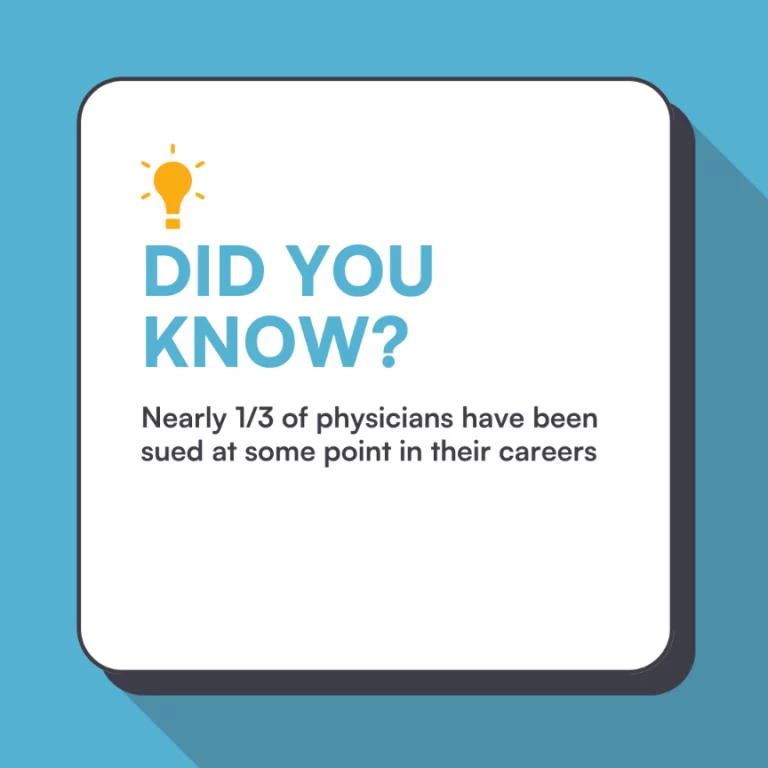
So, even though many med spa practitioners probably don’t want to think about what might go wrong, it’s better to be prepared for any eventuality.
A liability insurance policy also protects medspas against damages from fire, floods, theft, and other unforeseen events.
Common licensing challenges when opening a medspa in the U.S.
Even though opening a medical spa business on your own can be a rewarding venture, the process can sure be daunting, with many challenges along the way.
Varied state regulations
Running a medical spa is different in each state.
States have completely different regulations on who can own and operate a medical spa, who can perform specific procedures, and what licenses are required for different medical services.
It’s always worth making sure that any licenses you have are applicable in the state you plan to operate.
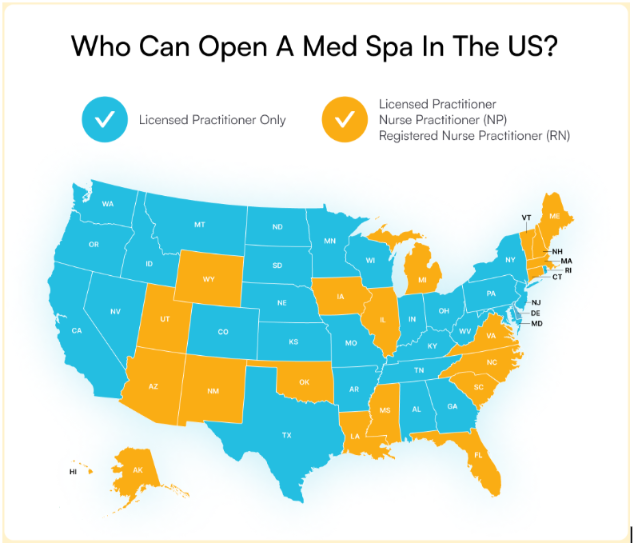
Medical supervision requirements
In most states, the main requirement is a medical degree (MD) from an accredited school, but exceptions exist.
For instance, dentists and chiropractors are often considered licensed physicians, but their scope of practice is limited to specific treatments.
Here’s a quick overview of how different medical professionals can be involved in medical spas and self-care businesses:
✅ Doctors: To become a licensed physician, a doctor must complete a Doctor of Medicine (a medical degree, known as an MD) and three years of residency.
✅ Nurse Practitioners: In states like Minnesota and New York, certified nurse practitioners and registered nurses can open a medical spa, typically with physician supervision.
✅ Physician Assistants (PAs): PAs generally cannot own a medical spa or practice independently but may co-own or hold a minority interest with a practicing physician in some states.
They can check whether they are legit candidates for this in that state on the official State’s Medical License Board website.
Understanding the scope of practice
Due to different regulations in different states, it’s difficult for medspas to know exactly who can carry out certain procedures.
- In Alabama, only certified physicians can perform invasive treatments like Botox and laser procedures, while nurse practitioners can administer non-invasive laser treatments like skin resurfacing, laser treatments for acne, pigmentation treatments, etc.
- Under Hawaii’s state law, PAs, NPs, and RNs can perform procedures like collagen injections, Botox, and laser skin treatments, but only under physician supervision.
- In Massachusetts, non-physicians can perform services like injectables, chemical peels, and lasers if they obtain a clinic license from the Department of Public Health.
- In Nevada, only licensed physicians, PAs, trained dentists, RNs, ARNPs, and podiatric physicians can perform Botox and filler injections.
Keeping up with license renewal
License renewal requirements depend on the type of services your med spa offers and its location.
Day spas offering basic services like facials, manicures, and pedicures usually need only a one-time license or certification, with no renewal required.
In contrast, in medspas, where aesthetic procedures are administered, such as Botox injections or dermal fillers, the practitioner must participate in continuing education in that niche and be recertified to renew their license — typically every 2 to 3 years.
Knowing the type of business entity to form
The type of business you choose for your med spa will dictate many things, such as whether you’ll be the only one to keep your profits or share them with others or what your taxes will be,
The common entity choices include
- Professional Corporation (PC)
- Professional Medical Corporation (PMC)
- Service Corporation (SC)
- Professional Association (PA)
- Professional limited liability company (PLLCs)
- Limited liability partnership (LLP), and sole proprietorships
For medspas, LLCs and PLLCs are the most popular choices because they are flexible and have many tax options.
Facility and equipment standards
To adhere to the facility and equipment standards, medspas must also get a facility license from their state’s health department or medical board where that medspa will operate. This is to ensure they meet the physical setup requirements, such as
- Hygiene standards: Implementing strict sanitation protocols, including cleaning schedules, proper medical waste disposal, and sterilized instruments
- Equipment standards: Using high-quality equipment that’s safe to use in treatments
- Safety measures: Adhering to measures like emergency plans, proper ventilation, fire safety, and secure storage of hazardous materials
Continuing education and training
Ongoing education and training for medspa professionals isn’t just a recommendation – it’s a requirement in most states across the US.
Typically, this means is that they’ll need to attend courses or workshops every 1-2 years, depending on the state regulations. With new treatments and technologies emerging all the time, it’s essential for professionals to stay in the loop with the current techniques, technologies, and safety standards.
This way, they can offer top-tier spa services in compliance with the safety standards in healthcare aesthetics.
Keeping up-to-date on these changes is not just about adhering to the law. it’s also about maintaining the reputation and integrity of your medspa.
Simplify opening and running your medspa with Pabau 💯
If you’ve made it this far in the blog, you’re probably familiar now with the requirements for setting up your medspa, the qualifications and skills your med spa must have, and the licenses you need to obtain.
And it’s OK if you’re thinking, “Wow, there’s a lot to consider before I start.”
Tools like Pabau are also there to help. Our software is an all-in-one practice management solution designed to take the heavy lifting out of managing a medical spa. It could be a great fit if you want to:
- Simplify your booking process
- Send out intake forms automatically
- Access client records securely from anywhere
- Send out all client communications, automatically
It’s the hassle-free way to run a successful med spa.
Book a demo with Pabau and learn how it can help with this – it’s the least you can do for your newly opened medspa.

